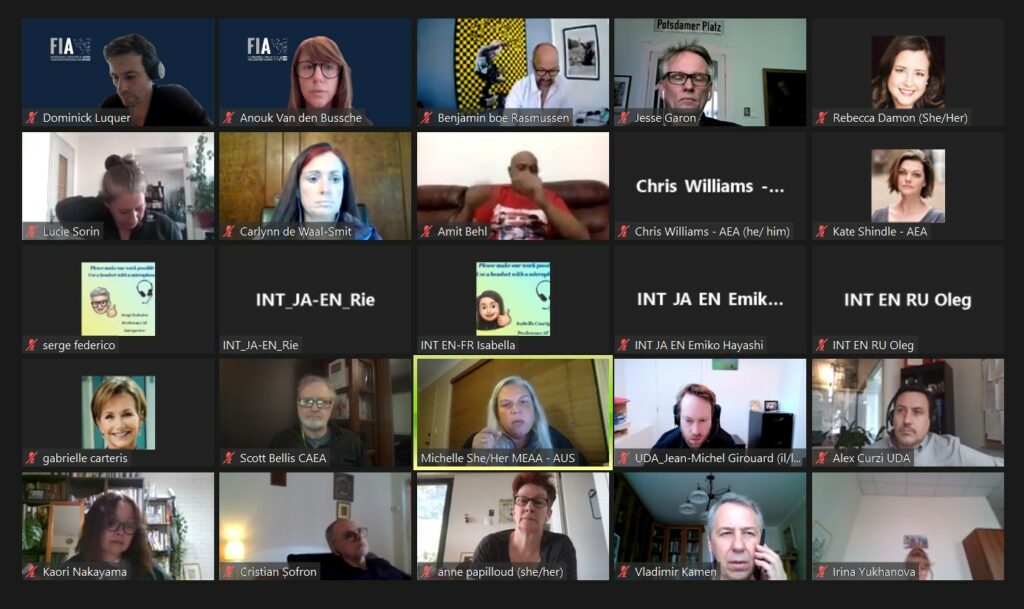There hardly is a country in the world with no theatre or live shows, and most FIA affiliates have grown a solid jurisdiction in the live performance sector over time. From public-funded institutions to commercial theatres, touring shows, circus, variety and immersive productions all the way to cooperative work and street theatre, hundreds of thousands of performers from around the world turn to the stage on a daily basis to express their art facing a live audience and to make a living. It is therefore of key importance for our members to share experience and best practices on trends, developments and challenges affecting the ability of their members to work safely, build a sustainable career and earn a decent income from their artistic endeavors.
With sanitary restrictions gradually easing up and public spaces finally reopening, in the aftermath of a global crisis threatening the long-term sustainability of the live performance sector, performer union leaders from 27 countries have come together on March 30, 2022, to take stock of the impact of the pandemic on the livelihood of performers but, more importantly, to describe the long-term bearing of the pandemic on collective bargaining, measure the pace of recovery and exchange on future challenges.
Many unions managed to engage constructively with employers to adjust their agreements and allow for more flexible terms of engagement, with a view to preserving the resilience of the sector in unprecedented times of need. They fiercely advocated for exceptional recovery and income support mechanisms, remodelled unemployment schemes and the rollout of furlough and short-time work arrangements, intended to save jobs and help protect performers from the devastation of long-term unemployment.
But they also managed to make the best of the situation to advance in other directions, issuing guidelines for members when self-taping for auditions, developing tools to enhance diverse casting opportunities for underrepresented members, brokering new and ground-breaking safety and health protocols, negotiating new terms of pay for the streaming of live performances or promoting far-reaching reforms to adapt social welfare and tax regulations to the irregular employment patterns in our sector.
As the world is gradually returning to normal, or rather to a new normal, the path to recovery is likely to be long and arduous for live theatrical sector and especially for commercial theatres that, much less reliant on public funding, have struggled to survive. The talent drain has been incredible, with thousands of performers leaving the profession to seek income opportunities elsewhere and replacing these professional skills will take a long time. Many countries are experiencing production bottlenecks, with shows that were put on hold through the pandemic now filling most venues and leaving little or no ground for new productions. Finding a first job for a freshly graduated student in the industry is incredibly hard at present. Audiences are struggling to come back to their normal levels after post-lockdown theatre re-openings and are reluctant to take up seasonal subscriptions, preferring last-minute sales instead. Theatrical scenes such as Broadway or the West End that traditionally also catered for a large international public continue to suffer the long-term consequences of travel restrictions, as people do not seem yet ready to envisage long journeys on confined public transport. With inflation rising to unprecedented levels, stagnating wages and a drop in purchasing power, the public has become more selective and must often face hard cost-cutting choices which often means foregoing non-essential activities.
The transition to a new reality will inform much of the work that performers and their unions will face in the immediate future. Accommodating it will become harder in the long run, as performers paid a heavy price whilst helping the industry stay afloat. Most of them have not benefited from the resilience and recovery funding that countries have lashed out at the cultural sector in any substantial way. If making ends meet in live theatre before the pandemic wasn’t hard already, it has become much worse today. The sustainability of the live theatrical sector cannot be achieved at the expense of performers and terms of pay are likely to be front and centre again as the curtains lift for good.







